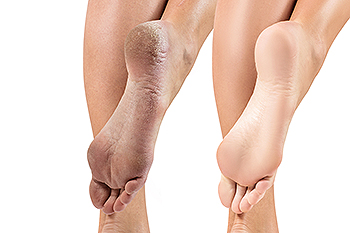

Cracked heels, a prevalent foot ailment, unfold as a result of a combination of factors intricately linked to foot care and lifestyle. The skin on the heels is naturally drier and thicker, making it prone to dehydration, especially in areas with low humidity or during seasons such as winter. Lack of proper hydration and moisturization contributes significantly to the development of cracked heels. Prolonged standing or walking on hard surfaces adds to the pressure on the feet, leading to the formation of calluses that may eventually crack. Wearing ill-fitting footwear, with open-back shoes being a common factor, exposes the heels to friction and worsens the condition. Medical conditions like eczema, psoriasis, or thyroid disorders can also contribute to skin dryness, increasing the risk of cracked heels. If you have developed problematic cracked heels, it is suggested that you consult a podiatrist who can offer you effective relief options, which may include prescribed medicine.
If the skin on your feet starts to crack, you may want to see a podiatrist to find treatment. If you have any concerns, contact Dr. Sybil J. Fisher from Texas. Our doctor can provide the care you need to keep you pain-free and on your feet.
Cracked Heels
It is important to moisturize your cracked heels in order to prevent pain, bleeding, and infection. The reason cracked heels form is because the skin on the foot is too dry to support the immense pressure placed on them. When the foot expands, the dry skin on the foot begins to split.
Ways to Help Heal Them
Ways to Prevent Cracked Heels
If you are unsure how to proceed in treating cracked heels, seek guidance from a podiatrist. Your doctor will help you with any questions or information you may need.
If you have any questions, please feel free to contact one of our offices located in Houston and Sugar Land, TX . We offer the newest diagnostic and treatment technologies for all your foot care needs.
Copyright © 2016 S.J. Fisher DPM | Site Map | Design by: Podiatry Content Connection